Find out more about the work of the vulnerability research group members below.
Dr Katharine Low
Senior Lecturer in Performance and Medical Humanities Education at King’s College London
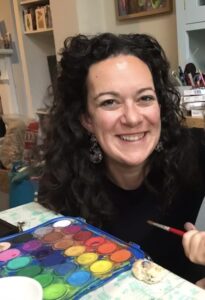
Dr Katharine Low is a performance-based practitioner-researcher and Senior Lecturer in Performance and Medical Humanities Education at King’s College London. Previously, she was Senior Lecturer in Applied Theatre and Community Performance at the Royal Central School of Speech & Drama.
Katharine has over 20 years experience in applied theatre practice and health, working in the fields of sexual health, gender equity and vulnerability in the UK and internationally. Her research centres co-collaborative participatory practices with arts & cultural organisations, medical practitioners and NGOs, by facilitating participatory theatre and arts-based workshops sparked by current social issues. Katharine’s research is focused on emancipatory action research and participatory research methodologies, including but not limited to: explorations of and challenging perceptions of vulnerability, women’s health and gender equity, health changes and radical kindness in performance practices, and methodologies as pedagogic approaches. Other current research interests include examining representations of gender equity within the theatre industry in the UK, developing performance practices with women living with HIV, and researching the impact of motherhood on academic life.
Her publications include: Applied Theatre and Sexual Health Communication: Apertures of Possibility (2020, Palgrave Macmillan) and Applied Theatre: Performing Health and Wellbeing with Veronica Baxter (2017, Bloomsbury Methuen). Katharine is currently hosting a podcast called Positively Women: Past and Present. She tweets about arts & health practice at @katlow17.
Dr Daniela Lai
Lecturer in International Relations, Royal Holloway (University of London)
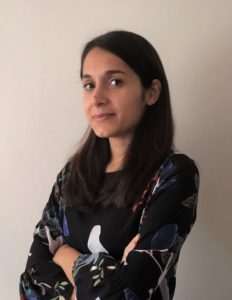
My research focuses on post-war justice, the politics and political economy of international interventions and post-war transitions. I have a particular interest in the gendered dimension of these processes and feminist approaches to the study of these topics. A lot of my work to date has been based on in-depth qualitative interviews and fieldwork, trying to recover experiences of wartime violence and post-war justice claims that have remained at the margins of the literature as well as of policy interventions. I am interested in thinking about what vulnerability can mean in conflict-affected contexts, both during war and in relation to community-based struggles for justice after war.
Dr Zalfa Feghali
Lecturer in American Literature, University of Leicester

I specialize in border studies, citizenship studies, and Indigenous studies as they play out contemporary US and Canadian literature and culture (and beyond). My work on borders and citizenship has led me to think about the interdisciplinary approaches needed to understand vulnerability. I’m working on three projects connected in varying ways to notions of vulnerability and insecurity:
The first is my next monograph, Alone, Missing, Murdered: Reading for Vulnerability Across North American Borders which adopts vulnerability theory to develop a new research method in literary and cultural studies. It examines US, Canadian, and Mexican cultural responses to what I argue is an ongoing hemispheric, cross-border crisis of raced and gendered vulnerability: the historic and ongoing missing and murdered Black and Indigenous People in the Americas and the femicide of Latinx and Indigenous women.
Second, I am co-editor of The Routledge Companion to Gender and Borderlands (under contract, 2023), which sets the agenda for the future of gender and borderlands studies on a global scale. This interdisciplinary collection brings together essays in history, literature, cultural studies, international politics, geography, media studies, development studies, sociology, and visual arts to examine how borderlands, influence and reflect gender dynamics globally.
Finally, I am a project member on the Leicester Institute for Advanced Studies-funded project “A Manifesto for Pandemic Sexual and Gendered Citizenships: Practicing Urgent Witnessing”. This international multidisciplinary collaborative project, drawing on team members’ expertise in history, geography, sociology, criminology, anthropology, literary studies, women’s studies, queer studies, and border studies, develops the practice of ‘urgent witnessing’, and will produce site-specific case studies, examining how sexual and gendered citizenships have been transformed during the pandemic.
Dr Hilary Evans Cameron
Assistant Professor, Lincoln Alexander School of Law at Ryerson University
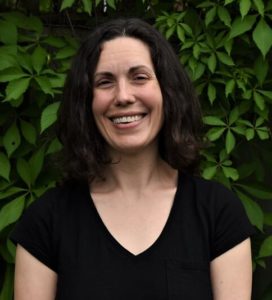
The legal structures that help judges and juries to make findings of fact necessarily increase one kind of insecurity at the expense of another. By presuming the accused innocent, for example, the criminal law in common law jurisdictions aims to shelter the accused to a greater degree from the risk of a wrongful conviction, in exchange for exposing the state to an increased risk of a wrongful acquittal. In any justice system, a normative judgment – Who should have to live with how much insecurity? – underlies decisions about very many aspects of the legal process, from who is allowed to participate, to what kinds of evidence they are able to bring forward, to what kinds of inferences decision-makers can draw from that evidence. My work considers this normative judgment in refugee law. How do – and how should – asylum systems manage the insecurities associated with refugee status decision-making?
Dr Mara Oliva
Associate Professor in US History, University of Reading
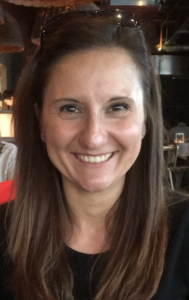
My current research project looks at the environmental security dimensions of US foreign policy since the end of the Cold War. Environmental security is a complex concept which still lacks an exhaustive definition. My research looks at the following elements of environmental security: 1) it’s geopolitical impact, meaning the threats posed to national security by environmental change; 2) it’s economic impact; 3) it’s impact on human security, namely people’s right to live in a safe and healthy environment, as well as links to environmental justice and environmental refugees; 4) ecological security and the protection of our planet.
My research also examines how US politicians and media have portrayed the environmental security debate and their impact on public opinion’s perceptions and understanding of it.
Find out more about Mara’s project on environmental security and the research methods being used.
Charlotta Salmi
Lecturer in Postcolonial and Global Literature, Queen Mary University of London
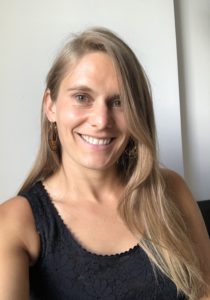
In my research, I’ve found that vulnerability is not just a state of insecurity or being more susceptible to harm (structurally or directly). It is also the basic premise of human intimacy and can offer a form of agency or, dare I say, ’empowerment’. Vulnerability, when deliberately unequal, is of course something we should work to reduce, but vulnerability is also a necessary part of protest (sticking your head above the parapet, as the saying goes) and is an important part of how we communicate and build bonds and communities, as well as solidarity. That’s all to say that vulnerability touches on a wide range of qualities that make us human. We shouldn’t necessarily see it as a negative concept (except when it is being amplified in certain groups or taken advantage of). Rather, we need to be wary of concepts like resilience, which place the responsibility over how vulnerability is managed on the individual, rather than on the political and social systems and structures that govern how vulnerability is distributed in a population.
Violence against women is a good example of this. It is human to be vulnerable to violence, but women should not be more subjected to violence, nor is it women’s responsibility to manage that violence. Women can, however, and do, expose themselves to raise their voices against violence. Any act of protest that challenges the law or hegemonic groups or ideas is an act of vulnerability on the part of the protester. Even more so, when the body that is placed on the line is more subject to violence or silencing in the first place.
My research is focused on how different forms of visual storytelling – comics, graphic novels and street art – are used by and to represent social movements. Specifically, I am preparing a book on how graphic narratives are used both by and against the state, e.g. in the Arab Spring, women’s and LGBTI rights movements in South Asia and beyond, Black Lives Matter and the recent refugee crisis.
As part of this research, I started a British Academy Sustainable Development project, Visualising Gender-Based Violence in Graphic Awareness Campaigns in Nepal in September 2018. My collaborator, Dr. Barbara Grossman-Thompson (California State University Long Beach), and I are looking at how comics and street art are used to combat domestic abuse, street harassment, trafficking and menstruation-based discrimination in Nepal.
Dr Susanne Hofmann
Marie Skłodowska-Curie Fellow, Latin America and Caribbean Centre at the London School of Economics and Political Sciences

In previous research studies, I have analysed the impacts of policies aimed at protecting women and other population groups deemed vulnerable to violence and exploitation. Core to my interests has been the nexus of the professionalisation of feminist anti-violence movements in contemporary Latin America, the judicialisation and bureaucratisation of activist strategies, and the sexual-affective and economic self-realisation projects of marginalised people.
I am interested in understanding how invasive natural resource extraction and large-scale infrastructure projects impact on the security of resident women and gender nonconforming people. Using the term body-territory, indigenous and popular feminisms in Latin America highlight that what happens to the land one inhabits and what happens to the body are intertwined: When inhabited places are depleted and environmentally damaged, the bodies of those who live there suffer detrimental effects too.
Whilst a focus on vulnerability foregrounds security and insecurity as embodied experiences, it is important to bear in mind that vulnerability is inherently a consequence of particular, historic configurations of social, political and economic life. The meanings and lived experiences of vulnerability must therefore be seen as intrinsically political, complex and layered, as well as mutable.
Currently, infrastructure megaprojects and natural resource extraction are able to violently unmake, harm and destroy ‘worlds’ – i.e. collectively co-constructed ways of being together and relating to each other and the nonhuman world – which become phenomena that are permanently lost. Invasive resource extraction and infrastructure projects generate socio-territorial reconfigurations, thereby globally generating a homogenous modern/colonial/capitalist ontology, that is maintained and naturalized, and which results in violence to indigenous land and bodies. My research explores land-based resistances, asking how strategies based on affective ties with land can (1) make the alternatives to the single world plausible, (2) weaken the dominant modern/colonial/capitalist world project, and (3) expand the spaces for the re/existence of other body-territories and worlds.
My current research project explores the ways in which, together, organised crime and securitised local resource conflicts impact on the insecurity and violence that women experience in the interoceanic industrial corridor of the Isthmus of Tehuantepec, Mexico. Focusing on the protection of women from the risk of becoming a victim of violent crime, I examine the co-production of security through state, corporate and community actors. I scrutinise how different community actors respond to gendered forms of insecurity, paying particular attention to citizen-led security efforts, or “security from below”.
Dr Dan Horner
Ryerson University

I am an urban historian who examines how people navigated an environment that was constructed around vulnerability: the 19th-century city. Using judicial records, newspapers, and government documents, I have examined how the residents of nineteenth century cities – the vast majority of whom were migrants from near and far – forged communities in the face of the daily challenge of making ends meet. I also examine the 19th-century city as a sort of laboratory for the project of liberal governance. These were places where elites became consumed with their own vulnerability, viewing threats to public order as existential threats to their very existence. Institutions like the police and cultural practices like parading emerged were enhanced throughout this period, often in the face of resistance both subtle and overt.
My next project examines Montreal’s urban fringe in the middle decades of the 19th century. While the city’s integration into a global capitalist economy brought unprecedented wealth to the heart of the city, the social and environmental costs of these transformations were made evident on the urban fringe. This was where the landscape was altered to suit the needs of those profiting from industrialization, and where the migrant labourers whose work fuelled the prosperity of this era found homes in ramshackle suburbs. The city’s outskirts also became a place of cultural encounter and exchange, where migrants crossed paths with the Mohawk of Kahnawàke. This research will examine how people used this region in strategic ways, and how the authorities struggled to impose their notions of order on the area through policing and real estate development. Reflections on vulnerability, power, and resistance will be woven through this study.
